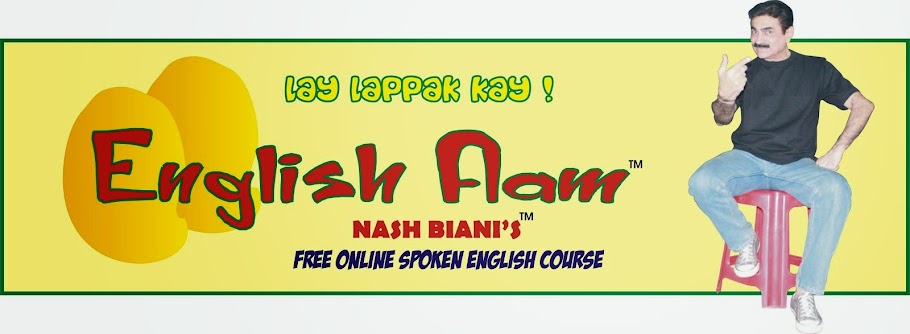Posted by Nash Biani
ABSOLUTE BEGINNER COURSE
SPOKEN ENGLISH
Lesson 4
(Page 2)
English Grammar: 'to be' verb
am-are-is
Section II
VOCABULARY & COLLOCATIONS
Some Words To Practise For Fluent English
Hello! In English Aam Spoken English Video Mehfil Lesson Number 4, we find quite a few words and collocations which will come in quite handy when we speak English and these words and collocations will help us become more fluent in English. For example, look at the word 'wait'. Isn't this something we will use many times in a week, or may be even a day when we start speaking English all the time in our daily life? The word 'wait' means, in Hindi-Urdu: pratiksha ,intezaar. Then we have the word 'ask'. This word means poochchna, sawal karna. But then, 'ask for' means 'maangna'. So, both 'ask ' and 'ask for' will be of great use to us when we speak English.
Two other words I would like to talk about here are 'people' and 'public'. The word 'people' means 'log' and the word 'public' means 'janta'. In English, the word 'people' takes the third person plural pronoun 'they'. The word 'public' on the other hand, takes the third person singular pronoun 'it'. So, we will say,
Many people came to the rally. They went home after the rally ended.
The public is tired of delays and excuses. It wants the new policies to be made effective as soon as possible.
In fact, all these words and collocations are very useful. Write them down in your books. Find out what the words in the vocabulary list mean in your mother tongue and write down these meanings in your book. Then, play the video mehfils and speak along with me.
ENGLISH AAM SPOKEN ENGLISH
VOCABULARY BOOK
- wait
- silent
- get
- whatever
- want
- say
- speak
- tell
- ask
- ask for
- once
- more
- but
- however
- anyway
- notice
- observe
- piece
- bit
- about
- people
- public
- breath
- breathe
- look
- here
- there
- building
- house
- home
- necessary
- needed
- required
- imagination
- habit
- tolerate
- bear
- live
- alive
- morning
- afternoon
- evening
- night
- exist
- thought
- past
- present
- future
- form
- from
ENGLISH AAM SPOKEN ENGLISH COLLOCATIONS
BOOK
look here
look there
look at
look at this
look at that
look at that car
look at that boy
look at that girl
I'm here
as much as you want
ask for
as much love as you want
as much milk as you want
you'll get
you'll get the cheque tomorrow
you'll get a call letter
you'll get tired
once more
it was nice
it was a nice
take note of
take notice of
a piece of
a bit of
people say
they say
it is said
I say
take a breath
draw breath
how do you
How do you go to work?
How do you open this?
How do you pay at the mall?
How do you say this in English?
in my mind
to my mind
in my thoughts
LESSONS IN ABSOLUTE
BEGINNER COURSE
CHAPTER 1
|
